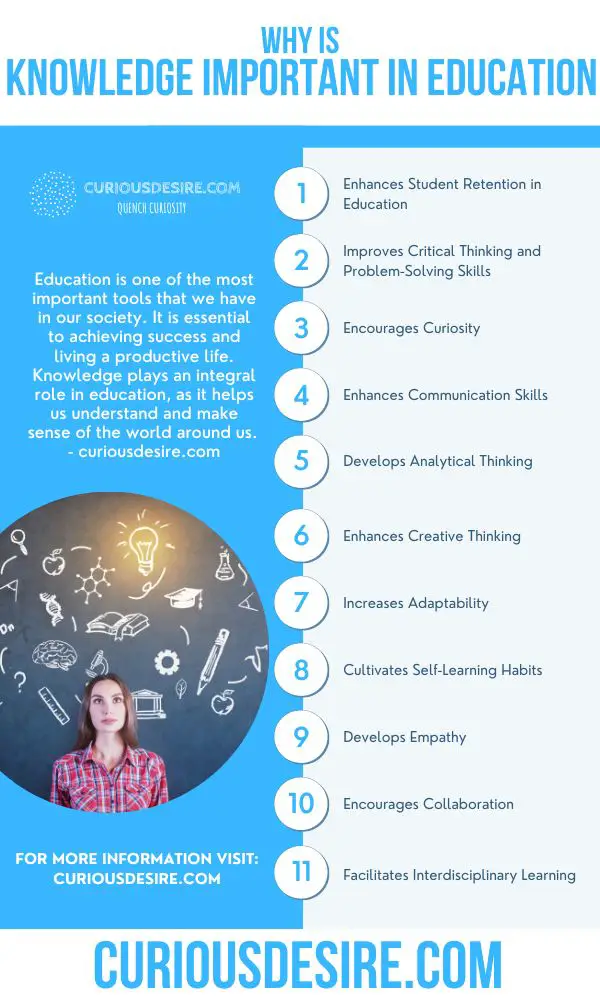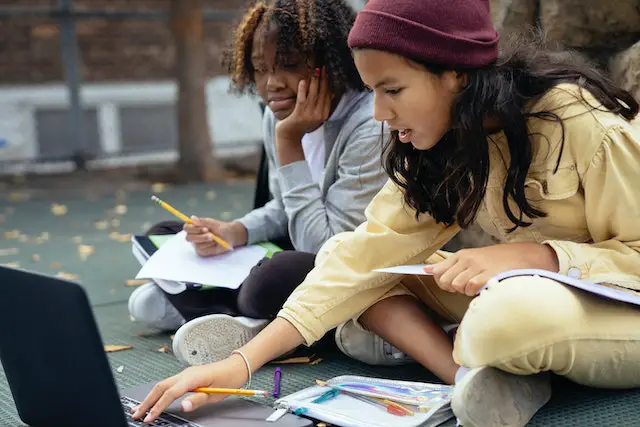Education is one of the most important tools that we have in our society. It is essential to achieving success and living a productive life. Knowledge plays an integral role in education, as it helps us understand and make sense of the world around us.
It helps us develop strong critical thinking and problem-solving skills. In this article, we will discuss 16 reasons why knowledge is important in education.
16 Benefits of Knowledge in Education
Knowledge helps us understand how the world works. Through knowledge, we can make informed decisions and develop better problem-solving skills. Here are 16 reasons why knowledge is important in education:
1. Knowledge Enhances Student Retention in Education
Knowledge enables students to better understand and retain the information they learn in school, which can be beneficial both in the classroom and later on when applying their knowledge to real-world situations. Through knowledge, students can more easily remember and recall facts, staying engaged in their lessons.
It also allows them to connect the different concepts they are taught, meaning that instead of simply memorizing facts and figures, they can draw meaningful conclusions and develop a deeper understanding of the topics they study.

2. Knowledge Improves Critical Thinking and Problem-Solving Skills
By understanding the underlying principles of a subject, students can learn to think critically and solve problems more effectively.
They can identify cause-and-effect relationships, make connections between different ideas, and develop effective strategies for solving challenges. It is an invaluable asset for success in the classroom and beyond.
3. Knowledge Encourages Curiosity
Knowledge encourages curiosity, which is a key component of learning and exploration. When students understand how things work, they are more likely to ask questions and seek out further information on their own rather than simply following instructions blindly.
This can foster a passion for learning and help students become more engaged in their studies. Moreover, it can lead to more meaningful discussions and deeper exploration of concepts.
4. Knowledge Enhances Communication Skills
Having an understanding of different topics enables students to communicate their ideas effectively, both orally and in writing. This is particularly important for success in higher education, where written assignments are often graded using criteria such as clarity, coherence, and persuasion.
By having a strong knowledge base, students can more easily express their ideas in an organized and convincing manner. This can also be beneficial in their professional lives as they will be better equipped to communicate their thoughts and ideas with colleagues.
Ultimately, knowledge helps students become more confident and articulate communicators.
5. Knowledge Develops Analytical Thinking
By studying and understanding the principles of a subject, students can develop analytical thinking skills. This allows them to break down complex problems into smaller components and then analyze each component separately in order to better understand the underlying causes and effects.
It also helps them make better decisions by considering the impact of their choices on long-term outcomes. Analytical thinking is an invaluable asset that can prepare students for success in both academic and professional settings.
6. Knowledge Enhances Creative Thinking
Knowledge also helps students become more creative thinkers by teaching them how to approach situations from different perspectives. This can help them find creative solutions to problems, brainstorm ideas more effectively, and develop innovative approaches.
For instance, by understanding the principles of mathematics, students can use their knowledge to devise new ways to solve complex equations. Similarly, by having a strong grasp of science, they can think outside the box and come up with creative solutions to scientific problems.

7. Knowledge Enhances Self-Confidence
With the right knowledge and skills in hand, students feel more confident in their ability to tackle any situation that comes their way. This confidence can help them gain more success both in the classroom and later on in life.
Knowledge also helps students overcome self-doubts and fears by providing them with a solid foundation of skills. This allows them to take on difficult tasks without hesitation, knowing that they have the necessary tools and knowledge to succeed.
8. Knowledge Increases Adaptability
With a deep understanding of various subjects, students can easily adapt to new situations and find solutions to problems more quickly. It also helps them develop the critical thinking skills needed to analyze a situation and come up with the best possible solution.
By having a broad base of knowledge, students can easily transition from one subject to another without feeling overwhelmed or lost. This increased adaptability can lead to more success both in their studies and beyond.
9. Knowledge Cultivates Self-Learning Habits
By understanding the principles of a subject, students learn how to use resources around them in order to gain more knowledge. This helps them develop self-learning habits that can be beneficial for the rest of their lives.
It also teaches them how to use different techniques and sources of information in order to gain a deeper understanding of a topic. This can help them become lifelong learners who are never afraid to tackle new challenges and explore new ideas.

10. Knowledge Develops Empathy
By gaining knowledge and understanding of different cultures, religions, and traditions, students can learn to be more empathetic towards others. This can help them build relationships in the classroom and later on in life.
Knowledge can also help students understand the different perspectives and beliefs of others, allowing them to be more understanding and compassionate in their interactions. This can lead to smoother communication, stronger relationships, and a healthier overall environment.
11. Knowledge Encourages Collaboration
By understanding different topics, students can work together more effectively. This can be beneficial when working on group projects or looking for solutions to complex problems.
It also allows them to appreciate the strengths and weaknesses of their peers, encouraging more collaboration and cooperation. This can be beneficial for both academic and professional settings, allowing students to achieve more success in their endeavours.
12. Knowledge Facilitates Interdisciplinary Learning
By understanding the principles of multiple disciplines, students gain a better appreciation for how each subject is connected and how their learning applies in different contexts.
Through interdisciplinary learning, students can gain a holistic understanding of a topic and develop the critical thinking skills needed to tackle complex problems. This allows them to think outside the box and come up with creative solutions to various challenges, both in their academic studies and later on in life.
13. Knowledge Promotes Cultural Understanding
Through knowledge, students can gain a better understanding of different cultures and how they interact with each other. This can be beneficial when working in multicultural environments or participating in international projects.
It also helps students appreciate their own culture and traditions, as well as those of others. This can lead to a more open-minded attitude and greater acceptance of diversity in all forms.

14. Knowledge Encourages Professional Growth
With the right knowledge, students can develop their professional skills and increase their employability prospects, which is especially important for those looking to pursue a career in a specific field.
For instance, they may gain a better understanding of the industry they’re interested in and be able to create a more effective resume or job application. This can give them an edge when competing for jobs, allowing them to achieve greater success in their career path.
15. Knowledge Allows for Better Decision-Making
With the right knowledge, students can make better decisions that are based on facts and evidence rather than gut instinct or opinion. This is important for every aspect of life, from personal to professional matters.
Through knowledge, students also learn to weigh the pros and cons of different options, as well as consider all possible outcomes before making a decision. This can help them save time and resources in the long run, allowing them to achieve better results with their choices.
16. Knowledge Develops Lifelong Learning Skills
By understanding the principles of a subject, students can develop the skills necessary to keep learning throughout their lives. This can be beneficial for those who want to stay up-to-date with changes in their field or pursue higher education.
Knowledge can also give students the confidence to take on new challenges and tackle complex problems, making them more well-rounded and prepared for any task they may face in their lives.
Conclusion
Knowledge is essential for success in any field, but it’s also important to understand how knowledge can lead to greater personal and professional growth. With the right knowledge, students can develop skills that will serve them throughout their lives and open up new opportunities that they may not have otherwise considered.
Ultimately, having a good understanding of different topics can help students become well-rounded individuals and better prepare them for the future.